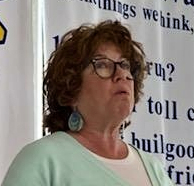
On April 25th, Lisa May Swatko addressed the Rotary Club of Nashua regarding her experiences with Special Olympics and the very positive role it has played in their family. Lisa’s son Ben, who is now 22, became involved with Special Olympics when he was 8 years old, which at that time was the youngest age allowed (now there is a program for those aged 2 through 7). Lisa chose to home-school Ben as it being the best option for him. Because of that, she actively sought out ways to expand his experiences outside of the home through organizations like Cub Scouts and Special Olympics. It was in Special Olympics that they found a strong level of understanding and acceptance.
In 2019, Ben wanted to join the track team, and he had a very positive experience that first year. However, in what was to be his second day, the coach left to go to college and there was no one to take her place. Very upset at that, Ben told his mom that she needed to do it. So, with no coaching or track experience, Lisa stepped up. She recruited a coaching partner who was experienced in the sport and Lisa took on all of the paperwork associated with the team. They’ve had a very successful track team ever since.
The Special Olympics motto is, “Let me win, but if I cannot win, let me be brave in the attempt.” That motto underlies all that happens with Special Olympics. Lisa defined disability and stated that it’s just one factor of a person, not “the” factor. This same philosophy motivated Eunice Kennedy Shriver to found the Special Olympics in 1962, in response to what she saw among the disabled community. In 1968, the organization had grown tremendously and held the first International Special Olympics games.
Here in Nashua, there are 14 athletes, aged 17 to in their 40s, who participate in nearly a dozen sports. The suggested volunteer to athlete ratio is 1:4, but in Nashua, it’s closer to 1:1.
Lisa then put Special Olympics into the context of the COVID pandemic we’ve all been living through. As humans, we’re designed to be social, to need interactions with others for our emotional and mental health, to feel connected and not alone. For those athletes with Special Olympics, that need is just as strong, but COVID presented barriers that were more significant that what we may have faced. Many lacked access to computers, or didn’t have the ability to navigate Zoom. Many lacked independent transportation and COVID-related restrictions made it difficult to move about as easily as before. Some lived in group homes, which were shut down much like nursing homes, with virtually no interaction with anyone outside of the home.
Many of the athletes are just starting to reconnect and re-engage as teams start back up again. While they still have to abide by many restrictions that most of us have left behind, the impact that Special Olympics has on their lives is even more evident now.
Lisa concluded by pointing to the Laconia State School. Once considered a state-of-the-art facility for people with disabilities, it ultimately became a symbol of the danger people with disabilities faced. We’ve come a long way, but there’s still much more to accomplish. Lisa then answered questions from Rotarians before thanking us for having her speak.